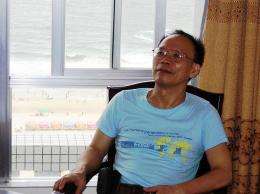China's online crusaders gain ground

Zhong Jizhang became a celebrity in China when he used the Internet to expose safety flaws in the subway of a major city. He is one of a growing number of online crusaders daring to challenge the system.
Nicknamed the "death-defying grandpa" due to the issue's sensitivity, he has lost his job and received death threats since he revealed problems with a metro extension in the southern city of Guangzhou that had passed inspection tests.
"There were threatening phone calls, and there were warnings that people were getting ready to cripple me," the 68-year-old engineer told AFP.
"Someone even told me that to exterminate me, they would run me over with a car, then drink alcohol and wait for the police so they would be done for drink driving but would get out of jail via their contacts."
Zhong, whose quality inspection firm has refused to renew his contract since he blew the whistle this summer, said he had tried various avenues to report the problem, including via government departments, but they failed to respond.
So he resorted to the Internet, creating a blog where he wrote about substandard concrete work. As Guangzhou was then about to host the Asian Games, the news found an audience and spread like wildfire.
China has the most Internet users in the world at 450 million, so the web presents a golden opportunity for people like Zhong who want to expose problems or incidents, especially as traditional media are strictly censored.
Authorities censor websites they deem unacceptable through a system dubbed the "Great Firewall of China", but users manage to bypass this through proxy servers, and blogs that are shut down quickly spring up again.
Yang Guobin, an associate professor at Columbia University who wrote a book about online activism in China, says the trend is on the rise.
"I covered over 70 major cases in my book which occurred in the span of a decade. Recently, I wrote an afterword... and I counted about 60 notable new cases for the two years of 2009 and 2010," he told AFP.
In the past few months alone, several cases have gained traction thanks to the Internet.
In October, the 22-year-old son of a senior police officer in the northern province of Hebei sparked online outrage when he hit two students while allegedly drink-driving, one of whom died.
When he was blocked from escaping the scene, the driver, Li Qiming, challenged people to sue him, shouting "my father is Li Gang."
The incident triggered a huge outcry on the Internet as an example of the brazen high-handedness of top officials and their families, and was picked up by traditional media.
Li was then arrested in an apparent victory for online activism. The English-language Global Times has since reported that he will be tried.
Jiang Huanwen, who runs a whistleblowing website, told AFP he had counted at least 200 such "anti-corruption" sites in China, not including individual bloggers who expose problems.
"Announcing and transmitting information on the Internet puts definite pressure on the government and judicial authorities, forcing them to investigate those who have been exposed," he said.
In the eastern province of Jiangxi, several officials were removed from their posts in September after three residents set themselves on fire in protest at the forced demolition of their home -- one of whom later died.
Mainstream media were initially silent on the news. But when the daughters of one of the victims were stopped as they tried to travel to Beijing to petition authorities over the case, they reached out to Chinese journalists for help.
These reporters posted their story on the Internet and soon a huge online campaign for their cause sprang up. A few days later, authorities announced the suspension of the officials, including a local Communist Party chief.
But experts warn the influence of the Internet is still extremely limited.
Hu Yong, a professor at Peking University and a leading Internet scholar, said this was especially true when authorities barred traditional media outlets from reporting incidents.
"Under these circumstances, it's not enough to simply rely on the power of netizens -- traditional media still plays a huge role," he said in an interview posted online.
David Bandurski, a researcher at the China Media Project at the University of Hong Kong, cautioned that new online features, such as micro-blogs, were always accompanied by more controls.
"If we think that the Internet is going to bring about fundamental change, that's a naive reading of the current situation in China," he said.
Zhong has learned the hard way. Guangzhou authorities have acknowledged the subway flaws but say they pose no safety risk.
(c) 2011 AFP





















